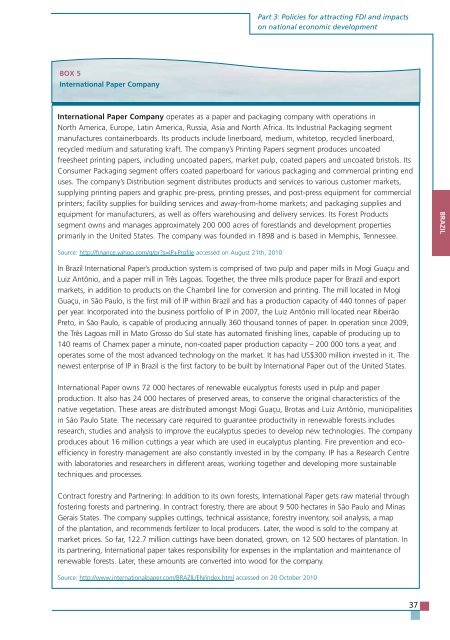TRENDS AND IMPACTS OF FOREIGN INVESTMENT IN DEVELOPING COUNTRY AGRICULTURE
TRENDS AND IMPACTS OF FOREIGN INVESTMENT IN DEVELOPING COUNTRY AGRICULTURE
TRENDS AND IMPACTS OF FOREIGN INVESTMENT IN DEVELOPING COUNTRY AGRICULTURE
Create successful ePaper yourself
Turn your PDF publications into a flip-book with our unique Google optimized e-Paper software.
BOX 5<br />
International Paper Company<br />
Part 3: Policies for attracting FDI and impacts<br />
on national economic development<br />
International Paper Company operates as a paper and packaging company with operations in<br />
North America, Europe, Latin America, Russia, Asia and North Africa. Its Industrial Packaging segment<br />
manufactures containerboards. Its products include linerboard, medium, whitetop, recycled linerboard,<br />
recycled medium and saturating kraft. The company’s Printing Papers segment produces uncoated<br />
freesheet printing papers, including uncoated papers, market pulp, coated papers and uncoated bristols. Its<br />
Consumer Packaging segment offers coated paperboard for various packaging and commercial printing end<br />
uses. The company’s Distribution segment distributes products and services to various customer markets,<br />
supplying printing papers and graphic pre-press, printing presses, and post-press equipment for commercial<br />
printers; facility supplies for building services and away-from-home markets; and packaging supplies and<br />
equipment for manufacturers, as well as offers warehousing and delivery services. Its Forest Products<br />
segment owns and manages approximately 200 000 acres of forestlands and development properties<br />
primarily in the United States. The company was founded in 1898 and is based in Memphis, Tennessee.<br />
Source: http://finance.yahoo.com/q/pr?s=IP+Profile accessed on August 21th, 2010<br />
In Brazil International Paper’s production system is comprised of two pulp and paper mills in Mogi Guaçu and<br />
Luiz Antônio, and a paper mill in Três Lagoas. Together, the three mills produce paper for Brazil and export<br />
markets, in addition to products on the Chambril line for conversion and printing. The mill located in Mogi<br />
Guaçu, in São Paulo, is the first mill of IP within Brazil and has a production capacity of 440 tonnes of paper<br />
per year. Incorporated into the business portfolio of IP in 2007, the Luiz Antônio mill located near Ribeirão<br />
Preto, in São Paulo, is capable of producing annually 360 thousand tonnes of paper. In operation since 2009,<br />
the Três Lagoas mill in Mato Grosso do Sul state has automated finishing lines, capable of producing up to<br />
140 reams of Chamex paper a minute, non-coated paper production capacity – 200 000 tons a year, and<br />
operates some of the most advanced technology on the market. It has had US$300 million invested in it. The<br />
newest enterprise of IP in Brazil is the first factory to be built by International Paper out of the United States.<br />
International Paper owns 72 000 hectares of renewable eucalyptus forests used in pulp and paper<br />
production. It also has 24 000 hectares of preserved areas, to conserve the original characteristics of the<br />
native vegetation. These areas are distributed amongst Mogi Guaçu, Brotas and Luiz Antônio, municipalities<br />
in São Paulo State. The necessary care required to guarantee productivity in renewable forests includes<br />
research, studies and analysis to improve the eucalyptus species to develop new technologies. The company<br />
produces about 16 million cuttings a year which are used in eucalyptus planting. Fire prevention and ecoefficiency<br />
in forestry management are also constantly invested in by the company. IP has a Research Centre<br />
with laboratories and researchers in different areas, working together and developing more sustainable<br />
techniques and processes.<br />
Contract forestry and Partnering: In addition to its own forests, International Paper gets raw material through<br />
fostering forests and partnering. In contract forestry, there are about 9 500 hectares in São Paulo and Minas<br />
Gerais States. The company supplies cuttings, technical assistance, forestry inventory, soil analysis, a map<br />
of the plantation, and recommends fertilizer to local producers. Later, the wood is sold to the company at<br />
market prices. So far, 122.7 million cuttings have been donated, grown, on 12 500 hectares of plantation. In<br />
its partnering, International paper takes responsibility for expenses in the implantation and maintenance of<br />
renewable forests. Later, these amounts are converted into wood for the company.<br />
Source: http://www.internationalpaper.com/BRAZIL/EN/index.html accessed on 20 October 2010<br />
37<br />
BRAZIL


